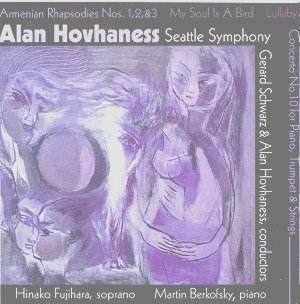ALAN HOVHANESS (b. 1911)
Armenian Rhapsody No. 1 (1944) 5.45
Armenian Rhapsody No. 2 (1944) 7.47
Armenian Rhapsody No. 3 (1944) 5.42
Symphony No. 38 (1978) 19.09
Concerto No. 10 for piano, trumpet and strings (1988)
22.11
 Hinako Fujihara (coloratura
soprano) in symphony
Hinako Fujihara (coloratura
soprano) in symphony
Martin Berkofsky (piano) in concerto
Chris Butler (trumpet)
Seattle SO/Gerard Schwarz (composer in Symphony)
rec (concerto and rhapsodies) Seattle, June 1996; (symphony) Seattle, May
1992
 KOCH-SCHWANN 3-7422-2H1
[60.32]
KOCH-SCHWANN 3-7422-2H1
[60.32]
Crotchet
Amazon
UK
Amazon
USA

As 'guardian angels' go Koch have been good to Hovhaness with at least half
a dozen of their CDs presenting his music.
This one groups three old (and concise) friends with a symphony and a concerto.
Remember that when numbering the concertos Hovhaness sequenced them across
the various genres. Hovhaness is prolific but this is not his tenth piano
concerto! It is his tenth concerto and it happens to be for piano and
orchestra.
All three rhapsodies are products of the war years and weave together Armenian
folk melodies and hymns. Their brevity might well make them a good place
to start an appraisal although they tend towards a sobriety and lower profile
than say Fra Angelico or the Majnun Symphony - both accessible
in every sense of that word on Crystal.
The first's legato fluency is exotic with a touch of Kodaly and of Islam.
The spiritual Second is undulant and liturgical with dance elements presented
over pizzicato steps. The Third's swaying and meditative Tunisian atmosphere
touches base with Rozsa's summer nights and the Tallis Fantasia.
Hinako Fujihara is the wife of the composer. The 38th symphony features her
vulnerably fragile voice in ionospherical melisma. She is partnered by the
perfection of Scott Goff's poetic flute in a soaring serene duet. The work,
in two unevenly paced movements, has a great sense of rest and of time moving
at an unthreatening pace. The strings, sometimes rather less than lush in
the rhapsodies, are here richer under the composer's direction.
Think of the Tenth Concerto as a six part suite. Slowly the piano reverently
picks out a typically understated melody further developed by the Tallis-like
strings. Next, over the rustling pizzicato of the violins, a reflectively
sauntering Japanese theme is chanted by the piano which then develops into
a quicker paced dance punctuated by bass strokes. A fast Lisztian allegro
recalls writing familiar from Shostakovich's Piano Concerto No. 2. The following
section over a gracious evocation of wavelets presents one of the composer's
most serene inspirations - flickering and quiet. The sober prayer of the
brass takes us towards the meditative sections of Vaughan Williams'
Antartica. The finale is sombre, ethereal and understated.
This is music about which there is nothing of the parade ground, no circus
and nothing kitsch.
The best notes so far for any Hovhaness album by Melinda Bargreen. A very
strong recommendation.
Reviewer
Rob Barnett

